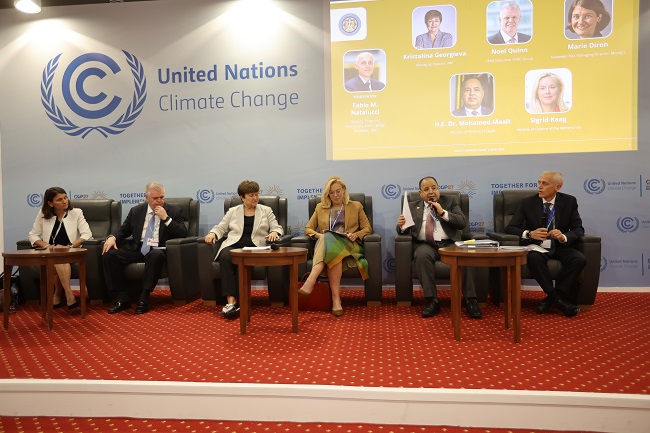Egypt’s COP27 Presidency and the United Nations Economic Commission for Africa on Wednesday, November 9, 2022, launched “Reducing the Cost of Green and Sustainable Borrowing” initiative in climate-vulnerable countries at COP27.

The initiative is aimed at addressing the larger issues of deteriorating fiscal health under threat by potential output losses linked to climate hazards and disaster recovery costs, as well as transition risks that may hit the economy at large.
During the launch of the initiative the Egyptian COP27 Presidency said: “Liquidity constraints remain some of the foremost barriers to allow African countries to invest towards climate resilience and the Sustainable Development Goals. This initiative will help build deeper, resilient, and sustainable financing to accelerate its post-Covid green recovery through various mechanisms.
“The focus will be on Green and Social and Sustainable (GSS) Bonds to fill the SDG financial gaps. There is a need for climate action to reduce poverty and promote shared prosperity in a sustainable manner. This initiative will strengthen the ability of African states to borrow at an affordable rate, mobilise more green funding, and attract private capital.”
African countries can lower green borrowing costs by pulling various levers, such as the below proposed mechanisms:
- Liquidity and Sustainability Facility (LSF): It seeks to lower governments’ borrowing costs by increasing demand on their sovereign bonds.
- Harmonisation of ESG Standards: To introduce a global baseline of sustainability disclosures to meet the needs of capital markets contributes to enhance transparency, accountability, efficiency, and comparability across markets.
- Proposal of a Sustainability Sovereign Debt Hub (SSDH): It seeks to establish a sustainable sovereign debt hub aimed at providing facilitation for sovereign debt issuances aligned with climate and nature building on its research as well as assisting the scaling of performance-linked sovereign debt.
- Capacity Building for developing countries to reliably access GSS Bond markets: It aims to allow African countries and developing countries in general to have more regular access to the GSS Bond markets.
- Guarantees from Multilateral Development Banks (MDBs): It seeks to accelerate mobilising external finance, including external debt and ODA, or avail more fiscal space through debt cancellation.
